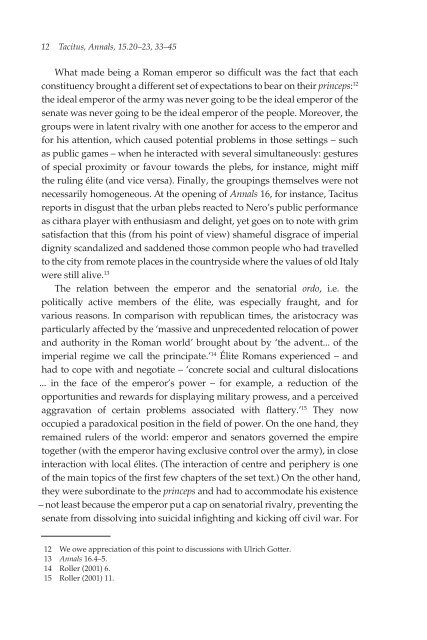Tacitus, Annals, 15.20-23, 33-45. Latin Text, Study Aids with Vocabulary, and Commentary, 2013a
Tacitus, Annals, 15.20-23, 33-45. Latin Text, Study Aids with Vocabulary, and Commentary, 2013a
Tacitus, Annals, 15.20-23, 33-45. Latin Text, Study Aids with Vocabulary, and Commentary, 2013a
You also want an ePaper? Increase the reach of your titles
YUMPU automatically turns print PDFs into web optimized ePapers that Google loves.
What made being a Roman emperor so difficult was the fact that each<br />
constituency brought a different set of expectations to bear on their princeps: 12<br />
the ideal emperor of the army was never going to be the ideal emperor of the<br />
senate was never going to be the ideal emperor of the people. Moreover, the<br />
groups were in latent rivalry <strong>with</strong> one another for access to the emperor <strong>and</strong><br />
for his attention, which caused potential problems in those settings – such<br />
as public games – when he interacted <strong>with</strong> several simultaneously: gestures<br />
of special proximity or favour towards the plebs, for instance, might miff<br />
the ruling élite (<strong>and</strong> vice versa). Finally, the groupings themselves were not<br />
necessarily homogeneous. At the opening of <strong>Annals</strong> 16, for instance, <strong>Tacitus</strong><br />
reports in disgust that the urban plebs reacted to Nero’s public performance<br />
as cithara player <strong>with</strong> enthusiasm <strong>and</strong> delight, yet goes on to note <strong>with</strong> grim<br />
satisfaction that this (from his point of view) shameful disgrace of imperial<br />
dignity sc<strong>and</strong>alized <strong>and</strong> saddened those common people who had travelled<br />
to the city from remote places in the countryside where the values of old Italy<br />
were still alive. 13<br />
The relation between the emperor <strong>and</strong> the senatorial ordo, i.e. the<br />
politically active members of the élite, was especially fraught, <strong>and</strong> for<br />
various reasons. In comparison <strong>with</strong> republican times, the aristocracy was<br />
particularly affected by the ‘massive <strong>and</strong> unprecedented relocation of power<br />
<strong>and</strong> authority in the Roman world’ brought about by ‘the advent... of the<br />
imperial regime we call the principate.’ 14 Élite Romans experienced – <strong>and</strong><br />
had to cope <strong>with</strong> <strong>and</strong> negotiate – ‘concrete social <strong>and</strong> cultural dislocations<br />
... in the face of the emperor’s power – for example, a reduction of the<br />
opportunities <strong>and</strong> rewards for displaying military prowess, <strong>and</strong> a perceived<br />
aggravation of certain problems associated <strong>with</strong> flattery.’ 15 They now<br />
occupied a paradoxical position in the field of power. On the one h<strong>and</strong>, they<br />
remained rulers of the world: emperor <strong>and</strong> senators governed the empire<br />
together (<strong>with</strong> the emperor having exclusive control over the army), in close<br />
interaction <strong>with</strong> local élites. (The interaction of centre <strong>and</strong> periphery is one<br />
of the main topics of the first few chapters of the set text.) On the other h<strong>and</strong>,<br />
they were subordinate to the princeps <strong>and</strong> had to accommodate his existence<br />
– not least because the emperor put a cap on senatorial rivalry, preventing the<br />
senate from dissolving into suicidal infighting <strong>and</strong> kicking off civil war. For<br />
12 We owe appreciation of this point to discussions <strong>with</strong> Ulrich Gotter.<br />
13 <strong>Annals</strong> 16.4–5.<br />
14 Roller (2001) 6.<br />
15 Roller (2001) 11.


















